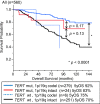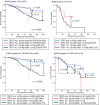TERT promoter mutation confers favorable prognosis regardless of 1p/19q status in adult diffuse gliomas with IDH1/2 mutations
- PMID: 33228806
- PMCID: PMC7685625
- DOI: 10.1186/s40478-020-01078-2
TERT promoter mutation confers favorable prognosis regardless of 1p/19q status in adult diffuse gliomas with IDH1/2 mutations
Abstract
TERT promoter mutations are commonly associated with 1p/19q codeletion in IDH-mutated gliomas. However, whether these mutations have an impact on patient survival independent of 1p/19q codeletion is unknown. In this study, we investigated the impact of TERT promoter mutations on survival in IDH-mutated glioma cases. Detailed clinical information and molecular status data were collected for a cohort of 560 adult patients with IDH-mutated gliomas. Among these patients, 279 had both TERT promoter mutation and 1p/19q codeletion, while 30 had either TERT promoter mutation (n = 24) or 1p/19q codeletion (n = 6) alone. A univariable Cox proportional hazard analysis for survival using clinical and genetic factors indicated that a Karnofsky performance status score (KPS) of 90 or 100, WHO grade II or III, TERT promoter mutation, 1p/19q codeletion, radiation therapy, and extent of resection (90-100%) were associated with favorable prognosis (p < 0.05). A multivariable Cox regression model revealed that TERT promoter mutation had a significantly favorable prognostic impact (hazard ratio = 0.421, p = 0.049), while 1p/19q codeletion did not have a significant impact (hazard ratio = 0.648, p = 0.349). Analyses incorporating patient clinical and genetic information were further conducted to identify subgroups showing the favorable prognostic impact of TERT promoter mutation. Among the grade II-III glioma patients with a KPS score of 90 or 100, those with IDH-TERT co-mutation and intact 1p/19q (n = 17) showed significantly longer survival than those with IDH mutation, wild-type TERT, and intact 1p/19q (n = 185) (5-year overall survival, 94% and 77%, respectively; p = 0.032). Our results demonstrate that TERT promoter mutation predicts favorable prognosis independent of 1p/19q codeletion in IDH-mutated gliomas. Combined with its adverse effect on survival among IDH-wild glioma cases, the bivalent prognostic impact of TERT promoter mutation may help further refine the molecular diagnosis and prognostication of diffuse gliomas.
Keywords: 1p/19q codeletion; CDKN2A; Glioma; IDH1/2; TERT.
Conflict of interest statement
The authors declare no conflicts of interest in association with this paper.
Figures


Similar articles
-
TERT promoter mutations contribute to subset prognostication of lower-grade gliomas.Mod Pathol. 2015 Feb;28(2):177-86. doi: 10.1038/modpathol.2014.94. Epub 2014 Aug 1. Mod Pathol. 2015. PMID: 25081751
-
CDKN2A homozygous deletion is a strong adverse prognosis factor in diffuse malignant IDH-mutant gliomas.Neuro Oncol. 2019 Dec 17;21(12):1519-1528. doi: 10.1093/neuonc/noz124. Neuro Oncol. 2019. PMID: 31832685 Free PMC article.
-
Adult infiltrating gliomas with WHO 2016 integrated diagnosis: additional prognostic roles of ATRX and TERT.Acta Neuropathol. 2017 Jun;133(6):1001-1016. doi: 10.1007/s00401-017-1690-1. Epub 2017 Mar 2. Acta Neuropathol. 2017. PMID: 28255664 Free PMC article.
-
Molecular background of oligodendroglioma: 1p/19q, IDH, TERT, CIC and FUBP1.CNS Oncol. 2015;4(5):287-94. doi: 10.2217/cns.15.32. Epub 2015 Nov 6. CNS Oncol. 2015. PMID: 26545048 Free PMC article. Review.
-
Radiation and chemotherapy for high-risk lower grade gliomas: Choosing between temozolomide and PCV.Cancer Med. 2020 Jan;9(1):3-11. doi: 10.1002/cam4.2686. Epub 2019 Nov 7. Cancer Med. 2020. PMID: 31701682 Free PMC article. Review.
Cited by
-
N6-methyladenosine-related microRNAs risk model trumps the isocitrate dehydrogenase mutation status as a predictive biomarker for the prognosis and immunotherapy in lower grade gliomas.Explor Target Antitumor Ther. 2022;3(5):553-569. doi: 10.37349/etat.2022.00100. Epub 2022 Sep 30. Explor Target Antitumor Ther. 2022. PMID: 36226036 Free PMC article.
-
Liquid Biopsy for Glioma Using Cell-Free DNA in Cerebrospinal Fluid.Cancers (Basel). 2024 Feb 29;16(5):1009. doi: 10.3390/cancers16051009. Cancers (Basel). 2024. PMID: 38473369 Free PMC article. Review.
-
Accelerated hyper-versus normofractionated radiochemotherapy with temozolomide in patients with glioblastoma: a multicenter retrospective analysis.J Neurooncol. 2022 Jan;156(2):407-417. doi: 10.1007/s11060-021-03926-0. Epub 2021 Dec 23. J Neurooncol. 2022. PMID: 34940951 Free PMC article.
-
Clinical implications of molecular analysis in diffuse glioma stratification.Brain Tumor Pathol. 2021 Jul;38(3):210-217. doi: 10.1007/s10014-021-00409-y. Epub 2021 Jul 15. Brain Tumor Pathol. 2021. PMID: 34268651
-
Identification and validation of a novel eight mutant-derived long non-coding RNAs signature as a prognostic biomarker for genome instability in low-grade glioma.Aging (Albany NY). 2021 Jun 3;13(11):15164-15192. doi: 10.18632/aging.203079. Epub 2021 Jun 3. Aging (Albany NY). 2021. PMID: 34081618 Free PMC article.
References
-
- Arita H, Narita Y, Fukushima S, Tateishi K, Matsushita Y, Yoshida A, Miyakita Y, Ohno M, Collins VP, Kawahara N, et al. Upregulating mutations in the TERT promoter commonly occur in adult malignant gliomas and are strongly associated with total 1p19q loss. Acta Neuropathol. 2013;126:267–276. doi: 10.1007/s00401-013-1141-6. - DOI - PubMed
Publication types
MeSH terms
Substances
LinkOut - more resources
Full Text Sources
Medical
Miscellaneous

